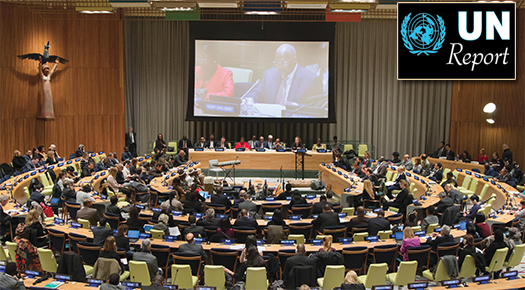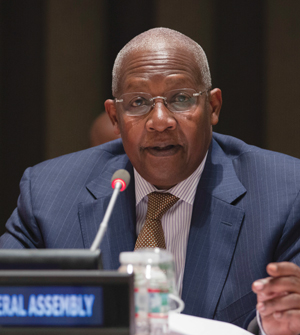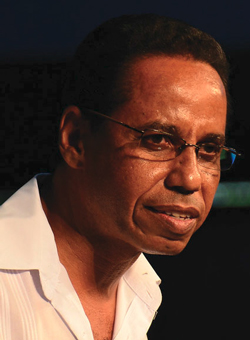By Saeed Shabazz -Staff Writer-

UNITED NATIONS – People of African descent still face racism in every nation, region and continent of the world, according to the president of the 193-member UN General Assembly, Sam Kutesa, a Ugandan diplomat. UN Secretary-General Ban Ki-moon, speaking through a representative said people of African descent suffer from inequality and disadvantage from the history of slavery.
Both men offered their messages on December 10 as the General Assembly launched the “International Decade of People of African Descent,” commencing on January 1, 2015 and ending on December 31, 2024 with the theme “People of African descent, recognition, justice and development.”
On development, Mr. Kutesa said the international community has come to recognize the correlation between poverty and racism. “Despite the evidence of the contribution people of African descent have made to the development of our societies, they are too often marginalized,” Mr. Kutesa added.
This decade is about focused and converted action to guarantee that “a decade from now the situation of people of African descent is improved,” the UN chief said. Creative initiatives will be the ones to make concrete impact on people’s lives, Mr. Ban noted, adding, “People of African descent are among the poorest and most marginalized around the world with limited access to healthcare, education and even employment.”

U.S. Ambassador to the UN, Samantha Powers said, “We believe strongly that the Decade for People of African Descent will be most effective in tackling racism if it is rigorous in its analysis of where discrimination persists, and if it encourages fact-driven interventions to address it.”
Jamaica considers the launch of the “decade” as an opportune provider of space and time to earnestly and practically address the implementation of the comprehensive Durban Declaration & Program of Action (DDPA). “We welcome the constructive engagement of all states in this exercise,” Jamaica’s Ambassador to the UN Courtney Rattay said.
The Dec. 10 launch is very fortuitous; and one of the main things we must address during the decade is reparations, stated David Commissiong, veteran reparations activist from Barbados. “It was Durban 2001 that laid the foundation for the International Decade for People of African Descent,” Mr. Commissiong told The Final Call. “And what we have to do is mobilize world opinion around reparations,” he added.
Dowoti Desir, human rights activist and author organized the DDPA Watchdog Group in 2009 in cooperation with organizations such as Southern Diaspora Research & Development Center, National Afro-Swedish Assoc., Asociaion de AfroColumbianos Semilla de Paz, Centro Dominicano de Paz, Federacion PanAfricaista, OGUN Taskforce for Haiti and Mouvement International pour les Reparations to further foster Article 34 of the DDPA.
Some of the main points in Article 34: people of African descent should be given their rights to culture, their own identity, and to foster their own forms of organization; to participate freely in political, social and economic life. In addition African descendants must actively participate in the design, implementation and development of educational systems and programs.

Ms. Desir, speaking to The Final Call after the completion of activities at the UN on Dec. 10, stressed “we need to make this a real decade with substantive markers; including how do we define reparations.” If we constrict reparations to solely mean financial repair, that is going to be a challenge, Ms. Desir said.
She said that during the launch ceremonies it was obvious that opposition for “reparatory justice” for the Trans-Atlantic Slave Trade would continue to come from nations such as the U.S., European Union, Canada, Israel, Australia and New Zealand.
“Isolate these recalcitrant White governments–use the UN to assume the moral high ground–making the struggle for reparations part of the international struggle for justice,” Mr. Commissiong said. Reparations provide a solution to the people for the continuing repairing of the damage, he added.
The “Decade” must be grounded in real language that people understand, argues Saladin Muhammad, a member of the U.S. Human Rights Network, organizer of the Southern Workers Assembly and Coordinator for the International Worker Justice Campaign.
“You can’t launch this ‘Decade’ without connecting this oppression that is being intensified–devaluing of Black lives and the influence of global capitalism led by the United States,” he told The Final Call.
“People of African descent are now suffering from decreasing access to work and social welfare programs and decreasing affordability of food, water, housing and other basic necessities plunging these groups of individuals further into even greater levels of poverty,” according to a 2013 report by the Office of the High Commissioner of Human Rights.
Mr. Muhammad argues that the U.S. and the United Kingdom must ultimately be taken before the International Court of Justice and charged with the historical conditions that plague people of African descent.
“We also must re-build our National Liberation Movement,” Mr. Muhammad said.
“It is clear that we have to bring world attention to bear on these issues; and we must act in a united way–act with power,” states Mr. Commissiong.












